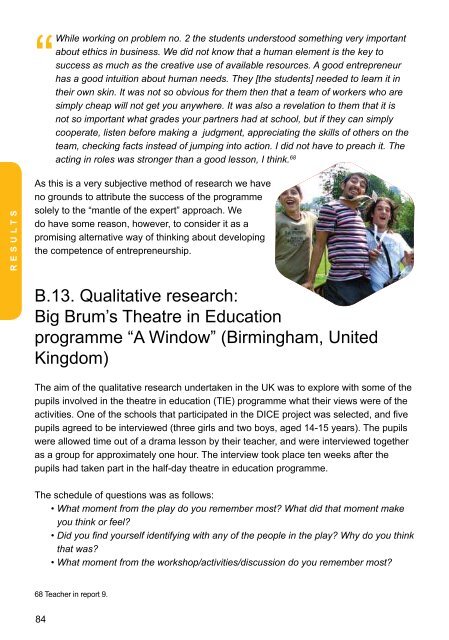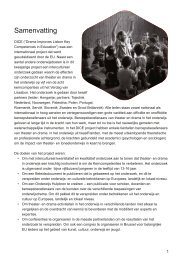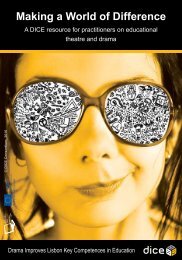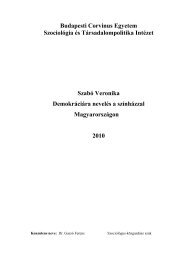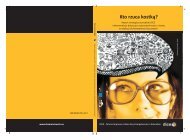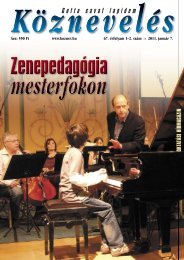Policy Paper - Drama Improves Lisbon Key Competences in Education
Policy Paper - Drama Improves Lisbon Key Competences in Education
Policy Paper - Drama Improves Lisbon Key Competences in Education
You also want an ePaper? Increase the reach of your titles
YUMPU automatically turns print PDFs into web optimized ePapers that Google loves.
R e s u l t s<br />
“<br />
While work<strong>in</strong>g on problem no. 2 the students understood someth<strong>in</strong>g very important<br />
about ethics <strong>in</strong> bus<strong>in</strong>ess. We did not know that a human element is the key to<br />
success as much as the creative use of available resources. A good entrepreneur<br />
has a good <strong>in</strong>tuition about human needs. They [the students] needed to learn it <strong>in</strong><br />
their own sk<strong>in</strong>. It was not so obvious for them then that a team of workers who are<br />
simply cheap will not get you anywhere. It was also a revelation to them that it is<br />
not so important what grades your partners had at school, but if they can simply<br />
cooperate, listen before mak<strong>in</strong>g a judgment, appreciat<strong>in</strong>g the skills of others on the<br />
team, check<strong>in</strong>g facts <strong>in</strong>stead of jump<strong>in</strong>g <strong>in</strong>to action. I did not have to preach it. The<br />
act<strong>in</strong>g <strong>in</strong> roles was stronger than a good lesson, I th<strong>in</strong>k. 68<br />
As this is a very subjective method of research we have<br />
no grounds to attribute the success of the programme<br />
solely to the “mantle of the expert” approach. We<br />
do have some reason, however, to consider it as a<br />
promis<strong>in</strong>g alternative way of th<strong>in</strong>k<strong>in</strong>g about develop<strong>in</strong>g<br />
the competence of entrepreneurship.<br />
B.13. Qualitative research:<br />
Big Brum’s Theatre <strong>in</strong> <strong>Education</strong><br />
programme “A W<strong>in</strong>dow” (Birm<strong>in</strong>gham, United<br />
K<strong>in</strong>gdom)<br />
The aim of the qualitative research undertaken <strong>in</strong> the UK was to explore with some of the<br />
pupils <strong>in</strong>volved <strong>in</strong> the theatre <strong>in</strong> education (TIE) programme what their views were of the<br />
activities. One of the schools that participated <strong>in</strong> the DICE project was selected, and five<br />
pupils agreed to be <strong>in</strong>terviewed (three girls and two boys, aged 14-15 years). The pupils<br />
were allowed time out of a drama lesson by their teacher, and were <strong>in</strong>terviewed together<br />
as a group for approximately one hour. The <strong>in</strong>terview took place ten weeks after the<br />
pupils had taken part <strong>in</strong> the half-day theatre <strong>in</strong> education programme.<br />
The schedule of questions was as follows:<br />
• What moment from the play do you remember most? What did that moment make<br />
you th<strong>in</strong>k or feel?<br />
• Did you f<strong>in</strong>d yourself identify<strong>in</strong>g with any of the people <strong>in</strong> the play? Why do you th<strong>in</strong>k<br />
that was?<br />
• What moment from the workshop/activities/discussion do you remember most?<br />
• Has be<strong>in</strong>g part of the programme changed the way you look at or th<strong>in</strong>k about th<strong>in</strong>gs<br />
or other people?<br />
• [Follow-up question to q4] Has it made you th<strong>in</strong>k about the world <strong>in</strong> different ways?<br />
• Do you th<strong>in</strong>k that you were able to make decisions about the work that was done <strong>in</strong><br />
the workshop / activities. Did you come up with ideas yourselves?<br />
• Were you able to share your ideas about the play with other pupils when you were<br />
<strong>in</strong> the workshop session?<br />
• Do you th<strong>in</strong>k that be<strong>in</strong>g part of 'A W<strong>in</strong>dow' has changed the way that you behave<br />
towards others?<br />
• Have you talked to anyone else about 'A W<strong>in</strong>dow' (apart from other pupils who took part<br />
<strong>in</strong> it)?<br />
The pupils were not shown the questions beforehand, and time was given to allow them<br />
to th<strong>in</strong>k about their answers and to return to them later <strong>in</strong> the session or to add to them<br />
when they wished. The <strong>in</strong>terview was conducted as a conversation, with the children<br />
respond<strong>in</strong>g as much to each other as to the <strong>in</strong>terviewer.<br />
The <strong>in</strong>terview was transcribed and then analysed for its relevance to the five <strong>Key</strong><br />
<strong>Competences</strong> be<strong>in</strong>g <strong>in</strong>vestigated by the DICE project. The follow<strong>in</strong>g comments from the<br />
children are particularly apposite <strong>in</strong> relation to the competences selected by DICE. (Some<br />
of them illustrate a relevance to more than one of the <strong>Lisbon</strong> <strong>Competences</strong>, but have<br />
here been allocated to the one that seems most relevant.)<br />
Communication <strong>in</strong> the mother tongue<br />
“<br />
I th<strong>in</strong>k it was good the way they got everyone <strong>in</strong>volved. There are the louder people<br />
<strong>in</strong> the class and the quieter people, but they’d ask the quieter people what they th<strong>in</strong>k<br />
and let them express what they th<strong>in</strong>k. In other lessons the quiet people just sit there<br />
and just listen to what everyone else says, and the louder people k<strong>in</strong>d of overpower<br />
them and they’re always talk<strong>in</strong>g and answer<strong>in</strong>g questions because they’re more<br />
confident. But Big Brum let the quiet people express what they th<strong>in</strong>k as well.<br />
Learn<strong>in</strong>g to Learn<br />
“<br />
When we asked a question to the actor-teachers they just repeated it back. It allowed<br />
us to get our bra<strong>in</strong>s <strong>in</strong> gear for it. Instead of ask<strong>in</strong>g and then gett<strong>in</strong>g an answer back, it<br />
allowed us to th<strong>in</strong>k about it.<br />
In drama they always ask ‘what do you th<strong>in</strong>k of this?’ We asked them ‘what do you<br />
th<strong>in</strong>k of this?’ and they asked back ‘well, what do you th<strong>in</strong>k of it?’ And that’s how they<br />
got all the stuff out…<br />
R e s u l t s<br />
68 Teacher <strong>in</strong> report 9.<br />
84<br />
85


